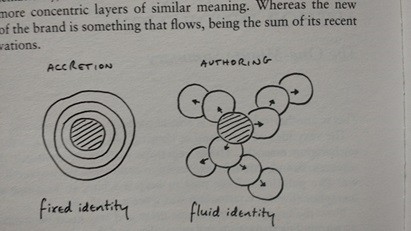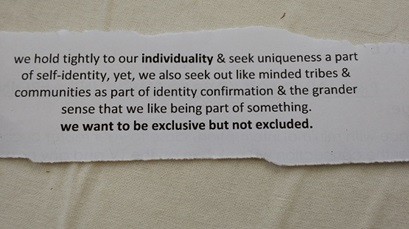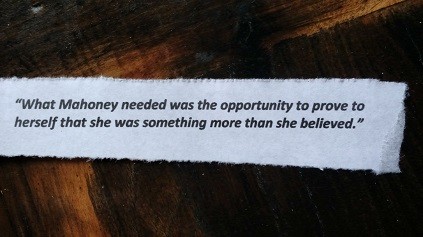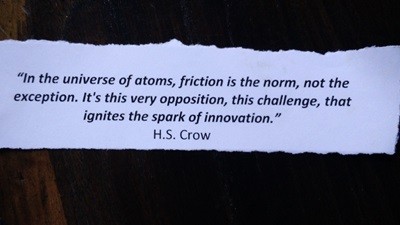
“We live mythically, but continue to think fragmentarily and on single planes.”
Marshall McLuhan
“We see the world piece by piece, as the sun, the moon, the animal, the tree; but the whole, of which these are shining parts, is the soul.”
Ralph Waldo Emerson
 Everything we perceive as reality is, in fact, constructed from fragments and fragmentation which, even when rationally constructed, can make life pretty confusing for the everyday person. Basically, this is a survival technique in that we grab onto some fragments to make sense of things the best we can. What becomes an existential survival crisis is WHAT fragments we grab onto. As Tony Fish suggests our root problem is that everything when framed with a maths or data mind is a decision. When framed by a psychologist or social scientist, everything becomes a choice. To someone who has authority and responsibility, or plays with complexity, everything is a judgment. Confusingly everything is an opinion to a judge. Math and data offer tantalizing fragments to judge and rationalize reality – sometimes well and sometimes not as well. That may all seem very confusing, but dependence upon different framing and beliefs, i.e., rationalizing fragments, creates some ‘life efficiency’ for each of us while simultaneously creating a brittle coherence to the community. In addition, this also tends to be reductionary. What I mean by that is inevitably this encourages us to act situationally rather than act based on scenarios. Once again, this is a reductionary life where we react as a matter of rule, work through heuristics (our rationalizing fragments) and then simply repeat the majority of our behavior, i.e., the shadows of previous decisions shine a spotlight on decision-making in the present.
Everything we perceive as reality is, in fact, constructed from fragments and fragmentation which, even when rationally constructed, can make life pretty confusing for the everyday person. Basically, this is a survival technique in that we grab onto some fragments to make sense of things the best we can. What becomes an existential survival crisis is WHAT fragments we grab onto. As Tony Fish suggests our root problem is that everything when framed with a maths or data mind is a decision. When framed by a psychologist or social scientist, everything becomes a choice. To someone who has authority and responsibility, or plays with complexity, everything is a judgment. Confusingly everything is an opinion to a judge. Math and data offer tantalizing fragments to judge and rationalize reality – sometimes well and sometimes not as well. That may all seem very confusing, but dependence upon different framing and beliefs, i.e., rationalizing fragments, creates some ‘life efficiency’ for each of us while simultaneously creating a brittle coherence to the community. In addition, this also tends to be reductionary. What I mean by that is inevitably this encourages us to act situationally rather than act based on scenarios. Once again, this is a reductionary life where we react as a matter of rule, work through heuristics (our rationalizing fragments) and then simply repeat the majority of our behavior, i.e., the shadows of previous decisions shine a spotlight on decision-making in the present.
Which leads me to social media’s superweapon: reinforcement learning.
Social networks are designed explicitly to command human attention and hijack free will. They are weapons of the science of persuasion and psychological vulnerabilities. Not only are algorithms designed to optimize engagement at any cost, but they triple down on that engagement through reinforcement learning – driving you down deeper and deeper into the darkness, fragment of engagement by fragment of engagement. Each step farther down into that blackness takes you farther and farther away from engaging with more meaningful, thoughtful, enlightening fragments (if not wholes). But where the reinforcement loops work hardest is by slinging endless customized content, tantalizing fragments, to captivate attention every step of the way. More and more data gets fed back into the algorithm reinforcement loops to further refine the manipulative powers and refine the ‘fragment house’ they offer as your home. It feels like a stream of consciousness when it really has little to do with your own conscious and more about fragments of consciousness some algorithm consciously teases out. Ah. But it gets a bit worse. While you feel actively engaged, you are really skimming along the top of superficial, non-demanding, fragmentation dressed up as meaningful “whole truths.” Reinforcement learning encourages you to see castles of sand as solid homes for enlightenment. And it does so deftly guiding you away from the time, and thoughtfulness, true enlightenment and understanding demands. We end up in unenlightened little fragments of cubbyholes tucked in tight with no room for any additional ideas.

Which leads me to what this means for personal identity.
Technology, through social media, aggressively attacks our identities blasting it apart in an onslaught of detailed fragments. This, in turn, makes social media & technology seem even more demanding of us, despite the fact it actually has a relatively simplistic structure (but warped by algorithms), consequently people started feeling a need that more detail was required, i.e., actually embrace the enemy. This doom loop of detail made something peculiar happen. Our identities gradually prove themselves incapable of absolute, whole, concepts. Identity simply becomes details. And, if the details aren’t coherent and well thought out, your identity simply became fragments floating out in technological space being bombarded with random algorithm driven asteroids.
As Marshall McLuhan would say we live mythically but continue to think fragmentarily and on single planes. It seems like almost all the action and reaction occurs at exactly the same time ignoring any complexity and ignoring any combinatorial consequences. So it appears that we live in the present, in some mythical way, continuing to think in the old fragmented space and time patterns. Inevitably this creates what Marshall McLuhan suggested as “the age of anxiety.”
Which leads me to unique and belonging.
Speaking of anxiety, let’s move on to uniqueness and belonging. The theory of organizational change revolves around the idea that if you cannot disturb the organizational identity filter then nothing changes. In other words, if a society wants to evolve and learn it must have the capacity for internal dialogue. Learning happens reciprocally, in context, and is vital to a thriving system. This is where diversity comes in. Diversity plays a role because it enhances community, if and only if, there is a vibrant network of relationships and if there is a free flow of information throughout. But let’s get back to uniqueness and becoming. Within lies a paradox of individuality and connectedness to un-like thinkers. The ubiquitous world of technology allows us to connect with more people, more ideas, more information. Most of it is beyond the limits of our cognitive capacity which traps us in this horrible doom loop of where does our ‘self’ begin, and where does it end (uniqueness), which leads to a doom loop of where does who I am and what I will be (becoming) begin and end. Hanzi Freinacht is the one who suggested the idea of transvidualism where the self actually contains part of the whole (fragments) which while most likely true only leads us to even more anxiety-driven questions: what does the self hold on to? Who are you? Is your reality yourself? is your identity ever just one thing but in constant motion and morphing with each interaction? I would be remiss if I didn’t point out all these questions suggest opportunities to accept our self-limitations and purposefully seek out, within the collective, ways to be part of things that are bigger than ourselves without losing are self-identity. But I imagine my larger point here is that people are increasingly a collection of fragments, some changing and some unchanging, and the proportionality of those two aspects is incredibly important in accepting ‘self,’ uniqueness, and belonging in a world with increasing fragments. And that becomes fairly important because if the increased fragmentation simply creates small-minded tribes that only generates societal friction. Arguably, tribes of equals are not always that smart mainly because they are hunkered down around a small campfire of fragments.

Which leads me to suggest the larger social issue actually resides in our misunderstanding of uniqueness and separateness and being part of a collective group.
Problems arise when uniqueness is associated with ‘being separate’ and when separateness gains a sense of faux specialness. When unique is tied to separate it tends to transform into an unhealthy sense of specialness (unique individualism) or a kind of narcissism feeding into a belief we can endlessly take from the collective without repercussion; because it feeds our isolated self in a zero-sum world. I would argue we far too often conflate uniqueness for separateness. Yeah. The truth is everything we do as ‘someone unique,’ we actually do as part of the collective whole. The paradox is we are unique because of the way we are interconnected with the rest of the humans. Yeah. Uniqueness is emergent from connection to other human beings (if not all nature). What I mean by that is each species in nature is unique, and plays a role in a vast symbiotic web of life, humans also play a role in a vast symbiotic web of humanity and society. What this means is a healthy sense of uniqueness, which begets healthy becoming, actually requires an active personal and societal strategy of deepening connections and integration of ‘fragments,’ not of separation. All that said. Ponder this. There is something odd about saying that everything is unique because this makes uniqueness something that everything has in common. Quite the contradiction to say that everything is the same insofar as everything shares in the quality of being unique, no? This is an important and sometimes mind bending contradiction, but I think it is important, especially in a fragmented world, to recognize uniqueness does not contradict some aspects of sameness because both sameness and uniqueness arise out of interconnection. Not to get too philosophical, but the universe is unique in relation to everything else, so everything in the universe is the same as everything else. I challenge everyone to take any two objects, or events, and list the ways they share common properties and qualities. This happens even if two things seemingly have nothing in common. But from a fragmented society perspective, what is truly ironic is it seems like we have a society obsessed with individualism and, yet, has little room for truly unique forms of self-expression. Despite individualism rhetoric, society (and social media) consistently denigrates our sense of self and does not allow for the formation of self reflectively unique personalities. I would argue fragments play a significant role in this. What I mean by that we have actually become quite limited (despite a ubiquitous online world) in how we can represent ourselves and others because communication has become overwhelmingly superficial through sound bites, tweets, and status updates which dominate connection platforms where we have to represent who and what we are. The superficiality is contrary to the type of reflective and prolonged engagements that truly foster uniqueness and self. Circling back to Marshall McLuhan, society seems to have an unhealthy focus on images, memes, superficial montages of misleading imagery, combined with an unnatural compression of time and space. What I mean by that is while time has not sped up, we actually treat time as fragments in which we use or are lost. All of this simply generates shallow forms of communication and understanding and, ultimately, differences (not uniqueness) which inevitably does not meet the true depth and nuance of uniqueness. Just as a reminder, this matters because personal clarity demands we seek places or people that remove doubts and obstacles about who and what we are. Self is an integrated image of oneself as a unique person and if we are only integrating the superficial into our self-feedback system, well, we will inevitably end up being shallow people desperately, and continuously, seeking meaning.

“The study of a situation should not seek to control the parts, or even the whole, but rather discover the underlying patterns which make up the aspects of potential.”
Which leads to me to a system that encourages fragmentation.
While its easy to point to technology, I would be remiss if I didn’t point out culture, or the overarching system itself, almost encourages fragmentation. What I mean by that is market-based capitalism emphasizes individual choice, competition, and zero-sum thinking, and the collective intelligence that arises from different choices. All that sounds good, or maybe okay, but it tends to create societies that are purposeless and fragmented and individual based (or collaboration is only seen as a necessary means to further self success), or as Arthur van den Bruck said, “gives everyone the freedom to be a mediocre man.” Yeah. Capitalism actually encourages mediocrity. Okay. How about over time the arc of capitalism bends toward mediocrity. The system is in a constant conflict by what stands and what changes, what’s bounded what is not, and how the existing power structure stratifies or doesn’t. what that means is while it often doesn’t appear like it, the system is mutually emergent; not unidirectional. And what that means is the reality is there is always a bit of resistance against the destructive fragmenting and destabilizing aspects of capitalism’s trappings. But the system encourages many people, under the guise it increases likelihood of success, to encourage individualism, alienation (zero-sum competition), fragmentation, entrepreneurial innovation, and all the things that discourage collective action which would actually force some change or at least challenge the existing power structure. Circling back to Tony Fish, maths and numbers and data are the primary weapon the system wields to encourage fragmentation (to the benefit of those in power). It is a daunting to challenge the fragmented system and society (which is monopolistic institutionally) because the system encourages individuality seeking to fragment any significant collective/community because it is actually ONLY a collective/community who can destruct an existing system and create a new one and those in power know that. That said. Beyond the increased emphasis on ‘self,’ the system almost encourages us to confuse, and conflate, what is ordinary and what is exceptional – for each individual (thereby confusing uniqueness, separateness and becoming). Sure. The system celebrates individuals, but typically not the ones who consistently invest in the greater good, more typically the economic successes. The truth is the economic narrative encourages fragmentation by encouraging everyone to believe individual successes begets collective progress. That is an incredibly flawed premise. Progress is never linear and is almost always asymmetrical and is optimized through collective action; not individual action. Lastly. The weird thing is the current system almost encourages pettiness and small-minded thinking in its facilitation of fragmentation and use of fragments, but that is another piece for another day.
“there is no ‘right time’ there is just time and what you choose to do with it”

Which leads me to connectivity and connections.
It may seem odd to end a piece on fragments with connectivity, but hear me out. Fragmentation is here to stay. We can try and wish away all the structural and transactional aspects of the larger system and society that enables fragments and fragmentation, but it’s just wishful thinking. Our efforts should be directed at educating people on how to enhance connectivity and reward communities and connections, in other words, learn to use fragments well. I have argued in the past that fractals, small linear components of a larger complex system, is where insights reside. I believe the same is true in a large, fragmented, complex society. While the blur of fragments and fragmentation encourage us to believe everything is vague and tenuous, the truth is connections and connectivity is what tethers us to sanity, community and meaning. It is within the experiences of connection which shapes us (even though we may not notice the actual shaping). Our self-identity, and ‘becoming,’ is the ultimate result of a complex series of steps, choices, and experiences over a long period of time. But, possibility, my larger point is collaboration, which is the outcome of connectivity, is just a means to an end and if the end justifies that means then you do what the end desires, not what you think is the right way to do something. Ultimately, people flow to ideas when the idea needs people. And maybe that is where fragments, in today’s world, are truly failing us. If fragments had the opportunity to flow freely and coalesce into grander ideas that benefit societal progress, I believe we would all be applauding a fragmented world because we were actually flowing to ideas that permit society to prosper – as a whole, not just individually. But that’s not the way its working. Fragments are actually driving us into smaller and smaller people and a smaller and smaller society. Ponder.


Leave a Comment